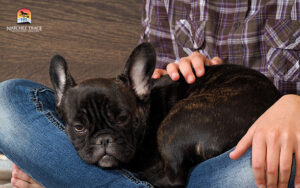 As a dog parent, you should know what to do if your dog has a seizure. Seizures in dogs can be scary, but knowing how to respond can give you peace of mind. This article will help you understand what to do, what can trigger a seizure in a dog, and how to manage these episodes calmly and effectively.
As a dog parent, you should know what to do if your dog has a seizure. Seizures in dogs can be scary, but knowing how to respond can give you peace of mind. This article will help you understand what to do, what can trigger a seizure in a dog, and how to manage these episodes calmly and effectively.
Watch the video below of Dr. Smith detailing what you can do when the seizure happens.
Understanding Dog Seizure Triggers: Common Triggers
Dog seizure triggers can vary, but common triggers include:
- Genetic factors: Some breeds are more prone to seizures.
- Injuries: Trauma to the head can lead to seizures.
- Health issues: Conditions like epilepsy, infections, or tumors can cause seizures.
- Toxins: Ingesting certain chemicals or plants can trigger seizures.
Knowing seizure triggers can help you prevent future episodes.
What to Do If Your Dog Has a Seizure
Stay Calm and Safe
 The first step in knowing what to do if your dog has a seizure is to remember to stay calm. Panicking will not help your pet and could make the situation worse.
The first step in knowing what to do if your dog has a seizure is to remember to stay calm. Panicking will not help your pet and could make the situation worse.
- Do not touch their mouth: Avoid putting your hands near your dog’s mouth; it might bite unintentionally.
- Move hazards away: Ensure nothing around can injure your dog during the seizure.
Timing the Seizure
- Track the duration: Note the length of the seizure. Most last less than 5 minutes. If it goes beyond 5 minutes, seek veterinary help immediately. If your dog has a series of seizures, time them and keep track of how often they occur.
 After the Seizure
After the Seizure
- Comfort your dog: Once the seizure passes, your dog might be disoriented. Comfort it with a calm voice and gentle petting.
- Consult your vet: Even if the seizure is brief, contact your vet for advice on what to do next.
Preventing Future Seizures
Dietary Changes
- Healthy diet: Ensure your dog has a balanced diet to help maintain overall health.
- Avoid toxins: Keep harmful substances out of reach to prevent accidental ingestion.
 Regular Check-ups
Regular Check-ups
- Vet visits: Regular veterinary check-ups can help identify and manage underlying conditions that might trigger seizures.
Conclusion
You need to understand what to do if your dog has a seizure and what might trigger the seizure. You can effectively manage these episodes by staying calm, keeping your pet safe, and consulting with your vet. Understanding dog seizure triggers and taking preventive measures can also help reduce the frequency and severity of seizures, ensuring your dog remains healthy and happy.







